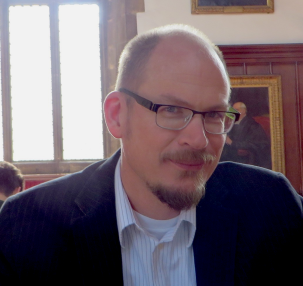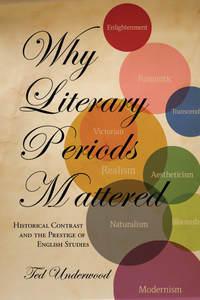 I teach both in the School of Information Sciences, and in the English Department, at the University of Illinois, Urbana-Champaign. I was trained as a Romanticist, but at this point my research is as much about information science as literary criticism. I’m especially interested in applying machine learning to large digital collections. Because “large digital collections” don’t quite exist yet in the form we would need for interesting literary research, a lot of my work involves correcting and enriching them. I recently finished a book about the new perspectives opened up by large digital libraries, called Distant Horizons: Digital Evidence and Literary Change (Univ of Chicago, Spring 2019).
I teach both in the School of Information Sciences, and in the English Department, at the University of Illinois, Urbana-Champaign. I was trained as a Romanticist, but at this point my research is as much about information science as literary criticism. I’m especially interested in applying machine learning to large digital collections. Because “large digital collections” don’t quite exist yet in the form we would need for interesting literary research, a lot of my work involves correcting and enriching them. I recently finished a book about the new perspectives opened up by large digital libraries, called Distant Horizons: Digital Evidence and Literary Change (Univ of Chicago, Spring 2019).
When I’m not messing about with computers and text, I sometimes mess about with flowers.
 Books
Books
Why Literary Periods Mattered: Historical Contrast and the Prestige of English Studies. Stanford, CA: Stanford University Press, 2013.
The Work of the Sun: Literature, Science, and Political Economy, 1760-1860. New York: Palgrave, 2005.
Journal Articles and Papers
Ted Underwood, David Bamman, and Sabrina Lee. “The Transformation of Gender in English-Language Fiction.” Journal of Cultural Analytics. February 13, 2018.
“A Genealogy of Distant Reading,” Digital Humanities Quarterly 11.2 (2017): http://www.digitalhumanities.org/dhq/vol/11/2/000317/000317.html
Ted Underwood and the NovelTM Research Group, “Genre Theory and Historicism,” Journal of Cultural Analytics (2016).
Ted Underwood and Jordan Sellers, “The Longue Durée of Literary Prestige,” Modern Language Quarterly 77.3 (2016): 321-44.
James F. English and Ted Underwood, “Shifting Scales: Between Literature and Social Science,” Modern Language Quarterly 77.3 (2016): 277-95.
“The Life Cycles of Genres,” Cultural Analytics (2016).
“The Literary Uses of High-Dimensional Space.” In Assumptions of Sociality: A Colloquium of Social and Cultural Scientists, a special issue of Big Data and Society, edited by John W. Mohr, Ronald L. Breiger, and Robin Wagner-Pacifici. 2015.
David Bamman, Ted Underwood, and Noah Smith. “A Bayesian Mixed Effects Model of Literary Character.” Proceedings of the 52st Annual Meeting of the Association for Computational Linguistics (ACL’14). 2014.
Andrew Goldstone and Ted Underwood. “The Quiet Transformations of Literary Studies: What Thirteen Thousand Scholars Could Tell Us.” New Literary History 45.3 (2014): 359-84. A site that allows you to explore the underlying model.
“Theorizing Research Practices We Forgot to Theorize Twenty Years Ago.” Representations 127 (2014): 64-72.
Ted Underwood, Michael L. Black, Loretta Auvil, and Boris Capitanu. “Mapping Mutable Genres in Structurally Complex Volumes.” Proceedings of the 2013 IEEE International Conference on Big Data. ArXiv preprint. Associated workset of HathiTrust metadata, paired with classification probabilities.
Ted Underwood and Jordan Sellers. “The Emergence of Literary Diction.” Journal of Digital Humanities 1.2 (2012).
“If Romantic Historicism Shaped Modern Fundamentalism, Would that Count as Secularization?” European Romantic Review 21.3 (2010): 327-43.
“Stories of Parallel Lives and the Status Anxieties of Contemporary Historicism.” Representations 85 (2004): 1-20.
“Romantic Historicism and the Afterlife.” PMLA 117 (2002): 237-51.
 “Historical Difference as Immortality in the Mid-Nineteenth-Century Novel.” Modern Language Quarterly 63 (2002): 443-469.
“Historical Difference as Immortality in the Mid-Nineteenth-Century Novel.” Modern Language Quarterly 63 (2002): 443-469.
“Skepticism and Surmise in Humphry Davy.” The Wordsworth Circle 34 (2003): 95-103.
“The Science in Shelley’s Theory of Poetry.” Modern Language Quarterly 58 (1997): 299-321.
“Productivism and the Vogue for ‘Energy’ in Late Eighteenth-Century Britain.” Studies in Romanticism 34 (1995): 105-123.
Press
Sarah Bond, Hoyt Long, and Ted Underwood. “Digital is Not the Opposite of Humanities.” Chronicle of Higher Education. November 1, 2017.
Ted Underwood, Hoyt Long, and Richard Jean So. “Cents and Sensibility.” Slate. December 10, 2014.
Book Contributions
Matthew L. Jockers and Ted Underwood. “Text-Mining the Humanities.” In A New Companion to Digital Humanities, edited by Susan Schreibman, Ray Siemens, and John Unsworth. 2016.
“Discontinuity and Culture (in the 1840s and in Foucault).” Philosophy and Culture. Ed. Rei Terada. Romantic Circles, 2008.
“How Did the Conservation of Energy Become ‘The Highest Law in All Science’?.” Repositioning Victorian Sciences: Shifting Centers in Nineteenth-Century Scientific Thinking. Ed. David Clifford, Elisabeth Wadge, Alex Warwick, and Martin Willis. London: Anthem Press, 2006. 119-130.


10 replies on “Ted Underwood”
[…] Ted Underwood’s “Imaginative Use of Numbers” looked not at the problem of analyzing results or creative accounting (considering “numbers as evidence”), but rather at the problem of how we should count words—which “strategies of discovery” are possible. The methodological focus of this talk was a paper that used topic modeling to scrutinize the print run of PMLA from 1924-2006. (The paper under discussion was co-written with Andrew Goldstone of Rutgers and is available here.) Topic modeling is a way of picking up patterns across large bodies of texts (see Underwood’s own definition and explanation). I tend to associate topic modeling with top-secret, government-sponsored email-reading, but this paper revealed its beautiful suitability for cultural discourse analysis. Underwood and Goldstone focused on changing critical approaches to texts in PMLA, and they found that the transitions between critical schools—which one might imagine in terms of rupture—are “smoother than you’d think.” Looking at the occurrence of topics across a wide stretch of texts revealed that it takes time for new critical paradigms to be registered in the way we write about texts. […]
[…] would I do such a thing? In part because I’ve come across such inspiring blogs as Ted Underwood’s, Matthew Jockers’, and Jeff Atwood’s, to cite just a few, which prove that if a blog is […]
[…] Ted Underwood’s “Imaginative Use of Numbers” looked not at the problem of analyzing results or creative accounting (considering “numbers as evidence”), but rather at the problem of how we should count words—which “strategies of discovery” are possible. The methodological focus of this talk was a paper that used topic modeling to scrutinize the print run of PMLA from 1924-2006. (The paper under discussion was co-written with Andrew Goldstone of Rutgers and is available here.) Topic modeling is a way of picking up patterns across large bodies of texts (see Underwood’s own definition and explanation). I tend to associate topic modeling with top-secret, government-sponsored email-reading, but this paper revealed its beautiful suitability for cultural discourse analysis. Underwood and Goldstone focused on changing critical approaches to texts in PMLA, and they found that the transitions between critical schools—which one might imagine in terms of rupture—are “smoother than you’d think.” Looking at the occurrence of topics across a wide stretch of texts revealed that it takes time for new critical paradigms to be registered in the way we write about texts. […]
[…] which is why I was thrilled to run across the Stone and the Shell blog, which is run by Ted Underwood of the University of Illinois. His post Topic Modeling Just Simple Enough offered a great […]
[…] which is why I was thrilled to run across the Stone and the Shell blog, which is run by Ted Underwood of the University of Illinois. His post Topic Modeling Just Simple Enough offered a great […]
[…] Ted Underwood […]
[…] Ted Underwood […]
[…] recent books on texts and data (Andrew Piper, Jessica Pressman) and on literary periods (Ted Underwood); recent articles on computation and evidence from New Literary History and Critical Inquiry; and […]
[…] Ted Underwood points out in his blog post titled, “Where to start with text mining“, much can be […]
[…] feeling – similar to the way I felt after the conversation last October (which also included Ted Underwood, Lauren Klein, Gimena del Rio Riande). There are too many disparate conversations happening without […]